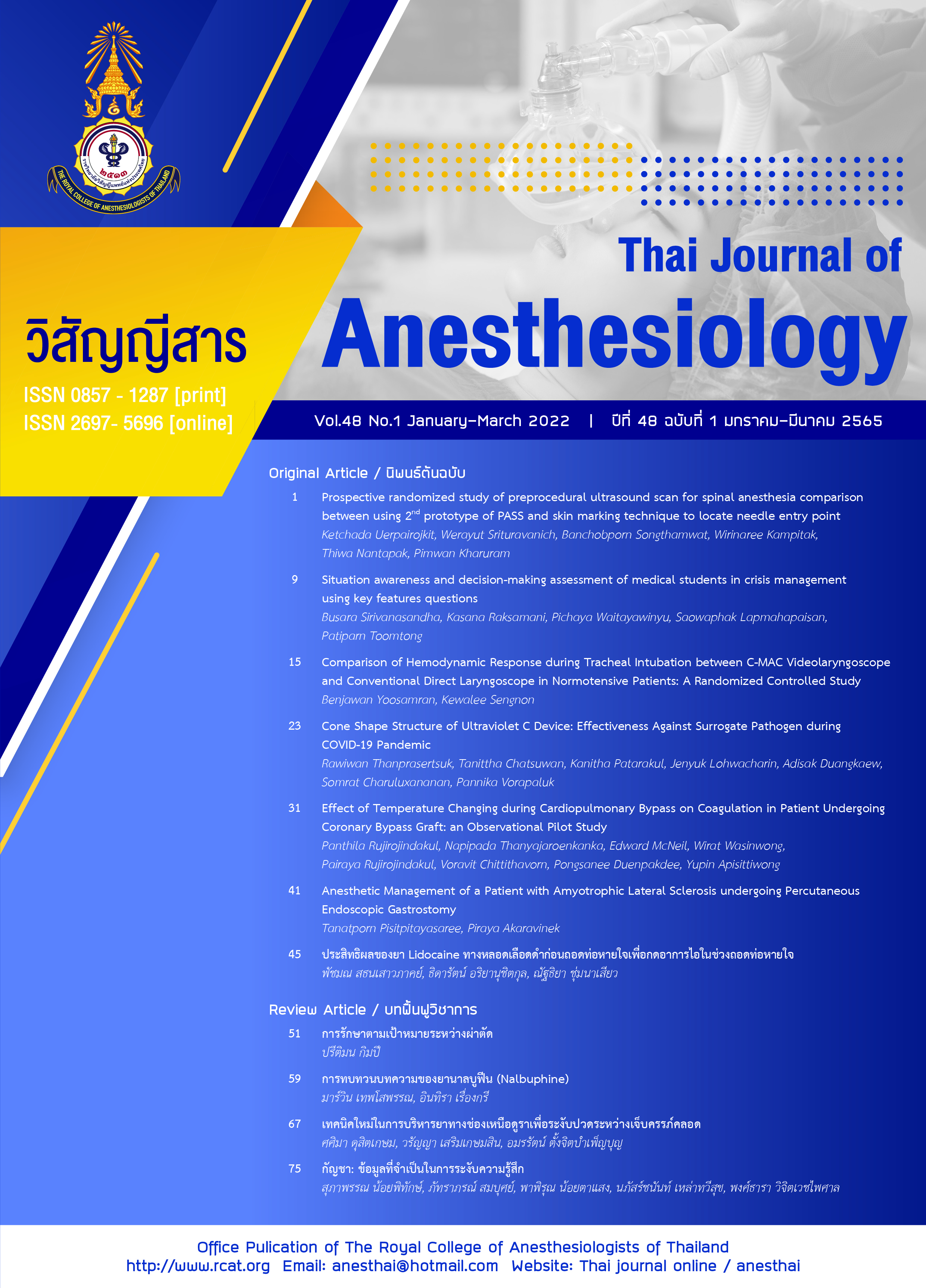Situation awareness and decision-making assessment of medical students in crisis management using key features questions
Main Article Content
Abstract
Objective: This study aimed to assess situation awareness and decision-making for perioperative crisis management in fifth-year medical students using key-features questions (KFQs) by applying the anesthetists’ non-technical skills and medical students’ non-technical skills framework as the key answers. Materials and Methods: Two-hundred and sixty 5th year medical students rotated to anesthesia clerkship from March 2013 to January 2014, all were assessed the approach to perioperative crisis management by KFQs. Two researchers made the scorecard and passing level to assess cognitive part of non-technical skills based on Anesthetists’ non-technical skills and Medical Students’ non-technical skills behavioral marker system. The KFQs answers were independently and retrospectively reviewed by 2 raters using the predefined scorecard. The answers that passed the passing standard for both raters were counted as passed. Results: Two-hundred and sixty KFQs answers were reviewed and scored. Two-hundred and eleven KFQs answers (81.2%) were able to pass the standard in level I of situation awareness; gathering information. While the level II (recognizing and understanding information) and III (anticipating) was reported as passed in 247 (95%) and 139 answers (53.5%) respectively. The passed answers for the decision-making category was 169 (65%), 77 (29.6%) and 134 (51.5%) for identifying options, balancing risks and selecting options and reviewing decisions respectively. The passed answers for escalating concerns was 62 (23.8%). Conclusions: Key-features questions can be used to assess cognitive parts of non-technical skills. Fifth-year medical students demonstrated sufficient level of situation awareness level I and II, while level III and all level of decision making are low.
Article Details

This work is licensed under a Creative Commons Attribution-NonCommercial-NoDerivatives 4.0 International License.
References
Gordon M, Darbyshire D, Baker P. Non-technical skills training to enhance patient safety: a systematic review. Med Educ. 2012;46(11):1042-54.
Flin R, Patey R. Improving patient safety through training in non-technical skills. Br Med J. 2009;339:b3595.
Fletcher G, Flin R, McGeorge P, Glavin R, Maran N, Patey R. Anaesthetists’ Non-Technical Skills (ANTS): evaluation of a behavioural marker system. Br J Anaesth. 2003;90(5):580-8.
Flin R, Patey R, Glavin R, Maran N. Anaesthetists’ non-technical skills. Br J Anaesth. 2010;105(1):38-44.
Nicolaides M, Cardillo L, Theodoulou I, Hanrahan J, Tsoulfas G, Athanasiou T, Papalois A, Sideris M. Developing a novel framework for non-technical skills learning strategies for undergraduates: a systematic review. Ann Med Surg. 2018;36:29-40.
Hamilton AL, Kerins J, MacCrossan MA, Tallentire VR. Medical Students’ Non-Technical Skills (Medi-StuNTS): preliminary work developing a behavioural marker system for the non-technical skills of medical students in acute care. BMJ Simul Technol Enhanc Learn. 2019;5(3):130.
Gordon M, Baker P, Catchpole K, Darbyshire D, Schocken D. Devising a consensus definition and framework for non-technical skills in healthcare to support educational design: a modified Delphi study. Med Teach. 2015;37(6):572-7.
Luctkar-Flude M, Baker C, Pulling C, McGraw R, Dagnone D, Medves J, Turner-Kelly C. Evaluating an undergraduate interprofessional simulation-based educational module: communication, teamwork, and confidence performing cardiac resuscitation skills. Adv Med Educ Pract. 2010;1:59.
Komasawa N, Berg BW. Interprofessional simulation training for perioperative management team development and patient safety. J Perioper Pract. 2016;26(11):250-3.
Olupeliyawa AM, O’Sullivan AJ, Hughes C, Balasooriya CD. The Teamwork Mini-Clinical Evaluation Exercise (T-MEX): a workplace-based assessment focusing on collaborative competencies in health care. Acad Med. 2014;89(2):359-65.
Nguyen T, Lim CP, Nguyen ND, Gordon-Brown L, Nahavandi S. A review of situation awareness assessment approaches in aviation environments. IEEE Syst J. 2019;13(3):3590-603.
Plavšić M, Klinker G, Bubb H. Situation awareness assessment in critical driving situations at intersections by task and human error analysis. Hum Factor Ergon Man. 2010;20(3):177-91.
Schulz CM, Endsley MR, Kochs EF, Gelb AW, Wagner KJ. Situation awareness in anesthesia: concept and research. Anesthesiology. 2013;118(3):729-42.
Daniel M, Rencic J, Durning SJ, Holmboe E, Santen SA, Lang V, Ratcliffe T, Gordon D, Heist B, Lubarsky S, Estrada CA. Clinical reasoning assessment methods: a scoping review and practical guidance. Acad Med. 2019;94(6):902-12.
Hrynchak P, Glover Takahashi S, Nayer M. Key-feature questions for assessment of clinical
reasoning: a literature review. Med Educ. 2014;48(9):870-83.
Shelton CL, Kinston R, Molyneux AJ, Ambrose LJ. Real-time situation awareness assessment in critical illness management: adapting the situation present assessment method to clinical simulation. BMJ Qual Saf. 2013;22(2):163-7.
Cooper S, Porter J, Peach L. Measuring situation awareness in emergency settings: a systematic review of tools and outcomes. Open Access Emerg Med: 2014;6:1.
Durso FT, Sethumadhavan A. Situation awareness: Understanding dynamic environments. Hum Factors. 2008;50(3):442-8.
Endsley MR. Measurement of situation awareness in dynamic systems. Hum Factors. 1995;37(1):65-84.
Frankel HL, Rogers PL, Gandhi RR, Freid EB, Kirton OC, Murray MJ, et al. What is taught, what is tested: findings and competency-based recommendations of the Undergraduate Medical Education Committee of the Society of Critical Care Medicine. Crit Care Med. 2004;32(9):1949-56.
Wingelaar TT, Wagter JM, Arnold AE. Students’ educational needs for clinical reasoning in first clerkships. Perspect Med Educ. 2012;1(2):56-66.
Gaba DM. Dynamic decision-making in anesthesiology: cognitive models and training approaches. In: Evans DA, Patel VL, eds. Advanced models of cognition for medical training and practice. Berlin, Heidelberg: Springer; 1992:p.123-47.
Croskerry P. The theory and practice of clinical decision-making. Can J Anaesth. 2005;52(1):R1-8.
Stiegler MP, Tung A. Cognitive processes in anesthesiology decision making. Anesthesiology. 2014;120(1):204-17.
Sturman N, Tan Z, Turner J. “A steep learning curve”: junior doctor perspectives on the transition from medical student to the health-care workplace. BMC Med Educ 2017;17(1):1-7.
Wald D, Peet A, Cripe J, Kinloch M. A simulated night on call experience for graduating medical students. MedEdPORTAL. 2016;12.


